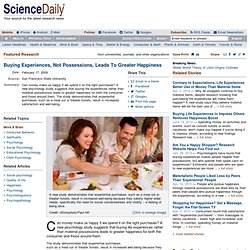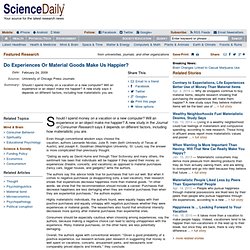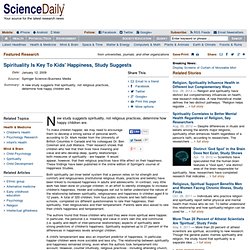

Being naughty or nice may boost willpower, physical endurance. New research from Harvard University suggests that moral actions may increase our capacity for willpower and physical endurance.

Study participants who did good deeds -- or even just imagined themselves helping others -- were better able to perform a subsequent task of physical endurance. The research, published in the journal Social Psychological and Personality Science, shows a similar or even greater boost in physical strength following dastardly deeds. Meditate To Concentrate. Researchers at the University of Pennsylvania say that practicing even small doses of daily meditation may improve focus and performance.

Meditation, according to Penn neuroscientist Amishi Jha and Michael Baime, director of Penn's Stress Management Program, is an active and effortful process that literally changes the way the brain works. Their study is the first to examine how meditation may modify the three subcomponents of attention, including the ability to prioritize and manage tasks and goals, the ability to voluntarily focus on specific information and the ability to stay alert to the environment. Brief Training In Meditation May Help Manage Pain, Study Shows. Living with pain is stressful, but a surprisingly short investment of time in mental training can help you cope.
A new study examining the perception of pain and the effects of various mental training techniques has found that relatively short and simple mindfulness meditation training can have a significant positive effect on pain management. Buying Experiences, Not Possessions, Leads To Greater Happiness. Can money make us happy if we spend it on the right purchases?

A new psychology study suggests that buying life experiences rather than material possessions leads to greater happiness for both the consumer and those around them. The study demonstrates that experiential purchases, such as a meal out or theater tickets, result in increased well-being because they satisfy higher order needs, specifically the need for social connectedness and vitality -- a feeling of being alive. "These findings support an extension of basic need theory, where purchases that increase psychological need satisfaction will produce the greatest well-being," said Ryan Howell, assistant professor of psychology at San Francisco State University.
Participants in the study were asked to write reflections and answer questions about their recent purchases. Participants indicated that experiential purchases represented money better spent and greater happiness for both themselves and others. Is Happiness Having What You Want, Wanting What You Have, Or Bot. Some argue that happiness is not having what you want, but wanting what you have.

This maxim sounds reasonable enough, but can it be tested, and if so, is it true? It turns out it can be tested. Texas Tech University psychologist Jeff Larsen and Amie McKibban of Wichita State University asked undergraduates to indicate whether they possessed 52 different material items, such as a car, a stereo or a bed. Their results, which appear in the April issue of the Association for Psychological Science’s journal, Psychological Science, suggest that people can grow accustomed to their possessions and thereby derive less happiness from them. They also suggest, however, that people can continue to want the things they have and that those who do so can achieve greater happiness. Do Experiences Or Material Goods Make Us Happier? Should I spend money on a vacation or a new computer?

Will an experience or an object make me happier? A new study in the Journal of Consumer Research says it depends on different factors, including how materialistic you are. Even though conventional wisdom says choose the vacation, authors Leonardo Nicolao, Julie R. Irwin (both University of Texas at Austin), and Joseph K. Goodman (Washington University, St. Happiness Lengthens Life.
Happiness does not heal, but happiness protects against falling ill.

As a result, happy people live longer. The size of the effect on longevity is comparable to that of smoking or not. This is concluded from an analysis of 30 follow-up studies published in a recent issue of the Journal of Happiness Studies. Genes Hold The Key To How Happy We Are, Scientists Say. Happiness in life is as much down to having the right genetic mix as it is to personal circumstances according to a recent study. Psychologists at the University of Edinburgh working with researchers at Queensland Institute for Medical Research in Australia found that happiness is partly determined by personality traits and that both personality and happiness are largely hereditary. Spirituality Is Key To Kids' Happiness, Study Suggests. New study suggests spirituality, not religious practices, determine how happy children are.

To make children happier, we may need to encourage them to develop a strong sense of personal worth, according to Dr. Mark Holder from the University of British Columbia in Canada and his colleagues Dr. Ben Coleman and Judi Wallace. Acts of kindness spread surprisingly easily: just a few people c. For all those dismayed by scenes of looting in disaster-struck zones, whether Haiti or Chile or elsewhere, take heart: Good acts -- acts of kindness, generosity and cooperation -- spread just as easily as bad.

And it takes only a handful of individuals to really make a difference. In a study published in the March 8 early online edition of the Proceedings of the National Academy of Sciences, researchers from the University of California, San Diego and Harvard provide the first laboratory evidence that cooperative behavior is contagious and that it spreads from person to person to person. Meditation Associated With Increased Grey Matter In The Brain. Meditation is known to alter resting brain patterns, suggesting long lasting brain changes, but a new study by researchers from Yale, Harvard, Massachusetts General Hospital, and the Massachusetts Institute of Technology shows meditation also is associated with increased cortical thickness.

The structural changes were found in areas of the brain that are important for sensory, cognitive and emotional processing, the researchers report in the November issue of NeuroReport. Although the study included only 20 participants, all with extensive training in Buddhist Insight meditation, the results are significant, said Jeremy Gray, assistant professor of psychology at Yale and co-author of the study led by Sara Lazar, assistant in psychology at Massachusetts General Hospital. "What is most fascinating to me is the suggestion that meditation practice can change anyone's grey matter," Gray said.
"The study participants were people with jobs and families. Brief meditative exercise helps cognition. Some of us need regular amounts of coffee or other chemical enhancers to make us cognitively sharper.

A newly published study suggests perhaps a brief bit of meditation would prepare us just as well. While past research using neuroimaging technology has shown that meditation techniques can promote significant changes in brain areas associated with concentration, it has always been assumed that extensive training was required to achieve this effect. Though many people would like to boost their cognitive abilities, the monk-like discipline required seems like a daunting time commitment and financial cost for this benefit.
Surprisingly, the benefits may be achievable even without all the work. Though it sounds almost like an advertisement for a "miracle" weight-loss product, new research now suggests that the mind may be easier to cognitively train than we previously believed. The study appears in the April 2 issue of Consciousness and Cognition. Patients Do Better With Psychotherapist Who Practice Zen Meditat. An investigation by German researchers headed by Professor Nickel indicates the practicing Zen meditation by psychotherapists matters. All therapists direct their attention in some manner during psychotherapy. A special form of directing attention, 'mindfulness', is recommended.
This study aimed to examine whether, and to what extent, promoting mindfulness in psychotherapists in training (PiT) influences the treatment results of their patients. The therapeutic course and treatment results of 124 inpatients, who were treated for 9 weeks by 18 PiTs, were compared. When The 'Trust Hormone' Is Out Of Balance. Study Reveals the Angriest Americans. Anger is more likely among the young, those with children at home, and the less educated, a new study finds. A national survey of 1,800 Americans aged 18 and older questioned participants on how and when they feel angry in order to build "a broader social portrait of anger in the United States," said study researcher Scott Schieman, now at the University of Toronto.
"Everything is amazing and nobody is happy" - a Fu. Finding the recipe for success in partnerships. (PhysOrg.com) -- Like a successful marriage, winning partnerships between profit and non-profit organizations require balancing the give and take and considering the needs of your counterpart. New research from Marlene J. Le Ber, PhD candidate, and Oana Branzei, Assistant Professor of Strategy and David G. Burgoyne Faculty Fellow at the Richard Ivey School of Business, investigates factors that contribute to successful partnerships between profit and non-profit organizations, known as cross-sector partnerships.
While cross-sector partnerships for such initiatives have advantages because they leverage the strengths of each party, incompatibilities might also jeopardize the relationship. Exploring four partnerships in Canadian health care involving large publicly traded companies and hospitals or hospital-based research institutes, the researchers discovered some ingredients for a successful mix. Divorce reduces chance of new, successful relationship. Why is late-life depression harder to treat? Scientists have found an important clue in the quest to understand why people who suffer from depression in later life are harder to treat and keep well in the long term. Stress make women social and men antisocial.
(PhysOrg.com) -- New studies by scientists at the University of Southern California have found that while stress may result in a universal physiological "fight or flight response" there are gender differences in psychological and behavioral responses. The new findings suggest stress makes women more social and more aware of facial expressions, while it tends to make men less social. In the sex game, stressed men choose dissimilar mates. Lose your teeth, lose your mind. (PhysOrg.com) -- Ever have a senior moment? 'Counterfactual' thinkers are more motivated and analytical, stu. (PhysOrg.com) -- "If only I had... " Almost everyone has said those four words at some time. Embrace your regrets and move forward, psychologist says. Have regrets? Older = happier.
(PhysOrg.com) -- UCI's Susan Turk Charles attributes study finding to seniors' ability to better regulate emotion. Why humans believe that better things come to those who wait. Beautiful women can be bad for your health, according to scienti.